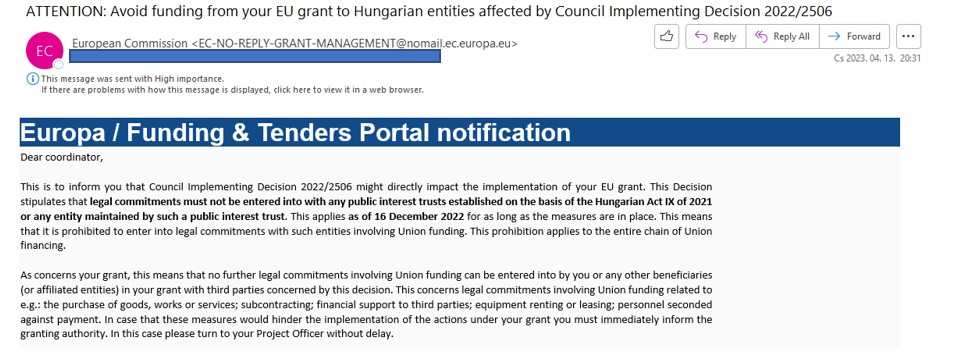The European Commission is carefully informing all current and potential future coordinators of Horizon Europe projects to make sure they are aware of the Council Implementing Decision 2022/2506. It is included in each Call Update section of each Horizon Europe topic, in response to which you may want to submit a proposal via the Funding and Tenders Portal. In addition, all coordinators of running projects have received an e-mail warning them:

The coordinators of all running projects received an e-mail from the European Commission, because the affected organisations cannot be contracted or subcontracted by a running project, as they cannot benefit from EU contributions of running projects.
Just to make it clear, this blog is not a political one.
We have already received questions from different organisations and just want to clarify what the Decision is actually about, as it seems that it has generated confusion. I would honestly highlight that such communication is seriously and negatively harming all the other Hungarian entities not affected by the mentioned Council decision. The Hungarian research and innovation community is an excellent one in many fields, and I think they deserve a clearer communication.
So, if you want to read the whole document, it is here. 16 pages of legal text. The main points are on page 15. More specifically Article 2:
1. 55 % of the budgetary commitments under the following operational programmes in Cohesion Policy, once approved, shall be suspended:
(a) Environmental and Energy Efficiency Operational Programme Plus;
(b) Integrated Transport Operational Programme Plus;
(c) Territorial and Settlement Development Operational Programme Plus.
2. Where the Commission implements the Union budget in direct or indirect management pursuant to of Article 62(1) points (a) and (c), of Regulation (EU, Euratom) 2018/1046, no legal commitments shall be entered into with any public interest trust established on the basis of the Hungarian Act IX of 2021 or any entity maintained by such a public interest trust.
Point 1 is about suspension and refers to Structural Funds and the Cohesion Fund, thus EU funding sources that are distributed with shared or indirect management. Shared, meaning the European Commission and the Hungarian governmental authorities share the management of the fund.
Point 2 is about being excluded completely, already stating both budgetary sources, all distributed via direct as well as indirect management. Horizon Europe is just one of the programmes that is implemented with direct management. But as you see, this point refers to all budgetary sources regardless of the way of management. And which entities does this refer to?
“Any public interest trust established on the basis of the Hungarian Act IX of 2021 or any entity maintained by such a public interest trust.”
What does this mean?
The Helsinki Committee explained this in 2021 way better than I would: “The concept of “public trust funds” (közérdekű vagyonkezelő alapítvány) was introduced by Act XIII of 2019 and became the format to which a number of higher education institutions were transformed into. The most well-known example of such transformation is the case of the University of Theatre and Film Arts. With the introduction of the concept of “public trust funds performing a public function” into the Fundamental Law, Act XIII of 2019 was also amended to reflect the creation of this subcategory as of 1 January 2021.”
Annex 1 of the Act lists those foundations that had been granted the status of “public trust funds performing a public function (https://njt.hu/jogszabaly/2021-9-00-00 - in Hungarian). These are the affected entities in Hungary.
There are many key Hungarian research and educational organisations amongst these. The exact list of Hungarian universities affected is included here:
-
Budapest Business School
-
University of Dunaújváros
-
University of Debrecen
-
Corvinus University of Budapest
-
Hungarian University of Agricultural and Life Sciences
-
Hungarian University of Dance
-
University of Veterinary Medicine Budapest
-
Moholy-Nagy University of Arts
-
Semmelweis University
-
János Neumann University
-
University of Nyíregyháza
-
University of Pannonia
-
Óbuda University
-
University of Sopron
-
István Széchenyi University
-
University of Szeged
-
University of Theater and Film Arts
-
Hungarian University of Physical Education
-
Tokaj-Hegyalja University
-
University of Miskolc
-
University of Pécs
It is sad to see what is happening, to say the least. But there are other Hungarian research and educational entities that should be considered as excellent partners in EU projects. Please continue considering them in your current and future proposals.





